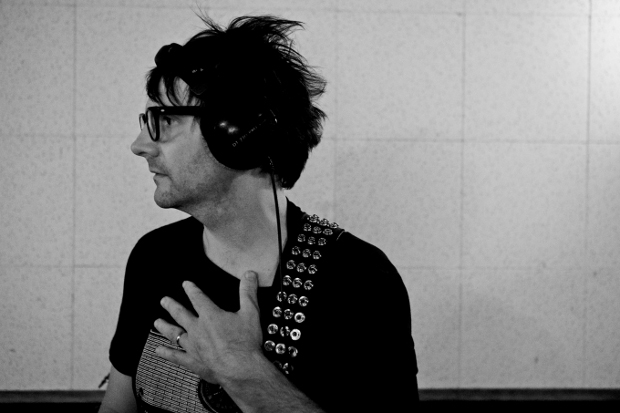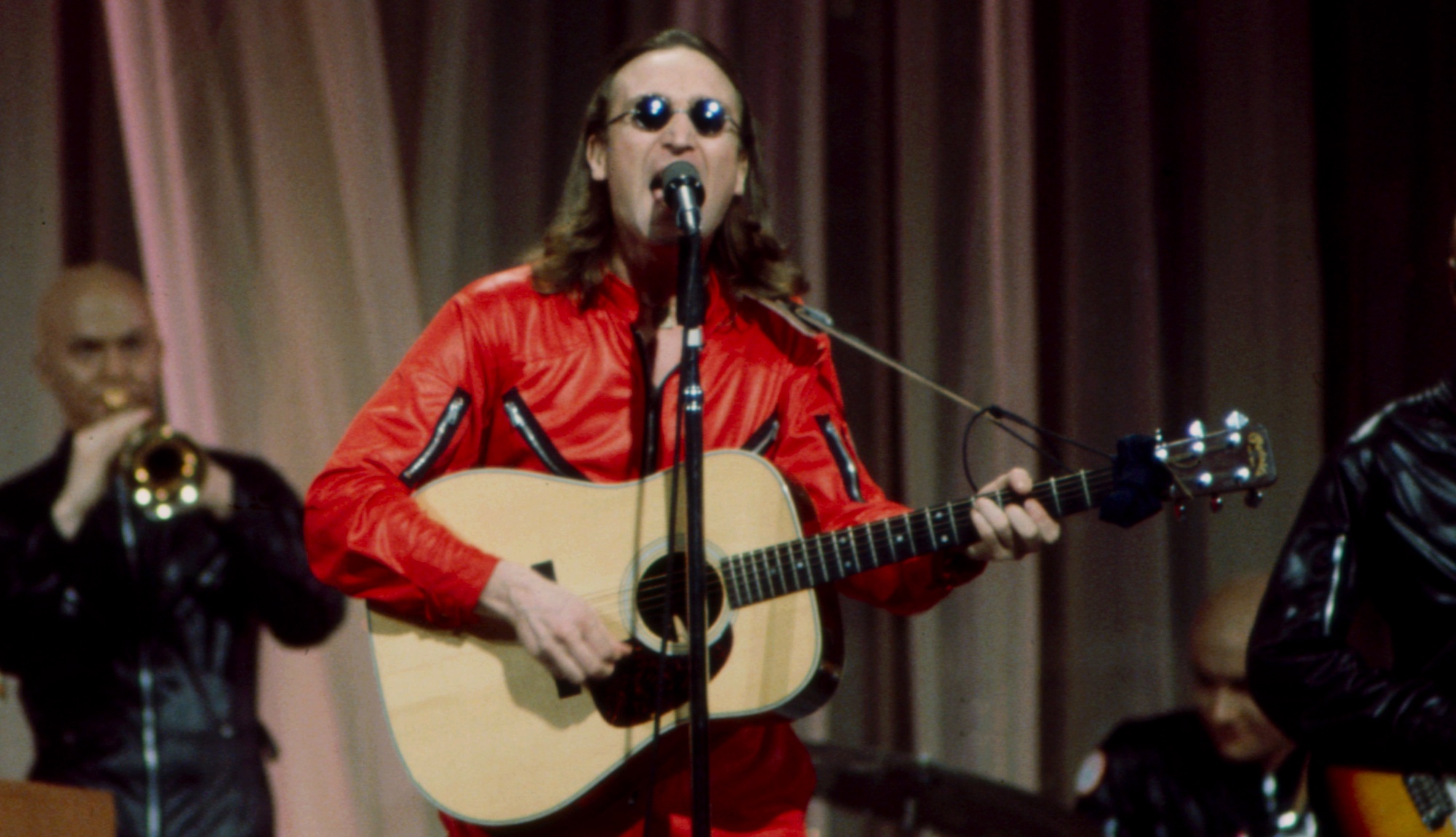Songcraft: Mike Viola Talks Songwriting Triage, Movie Music and Arcade Backlines
All the latest guitar news, interviews, lessons, reviews, deals and more, direct to your inbox!
You are now subscribed
Your newsletter sign-up was successful

One night, mid-Nineties, after catching a great set by singer-songwriter (not yet children's music superstar) Dan Zanes at New York City's Fez, I stuck around to take in "a bit" of the next act on the bill, the still-unknown-to-me Candy Butchers.
Thirty minutes later, much to my surprise and delight, I was still glued to my chair.
Singer-songwriter Mike Viola (along with fellow Candy Butcher and drummer Todd Foulsham) proceeded to blow up the room with his infectious brand of ultra-melodic, slightly retro, acoustic pop. Floored by set's end, I was sold.
A professional musician since his early teens in Boston, Viola has had a long, prolific and eclectic career; from issuing numerous, superb albums via the Candy Butchers' moniker as well as under his own name, to lending his musical talents to big-screen projects like Tom Hanks' That Thing You Do and the Judd Apatow productions Walk Hard and Get Him to the Greek.
Viola also has co-written and produced music with/for artists such as Ryan Adams, Jenny Lewis, Mandy Moore and Jill Sobule, to name just a few.
I spoke with Viola (now based in Los Angeles) from the road while touring as lead guitarist for Ryan Adams' new band, the Shining.
GUITAR WORLD: You write a lot of incredibly catchy, hook-filled tunes. Do "the hooks" come to you naturally or are they the products of plain, old-fashioned song craft/hard work?
All the latest guitar news, interviews, lessons, reviews, deals and more, direct to your inbox!
A little bit of both. When I feel a tug of what I think might be inspiration, I drop what I’m doing and go to work on it. That part of the process is never pretty for the people around me. Stopping the world can get messy.
You're a seriously prolific songwriter. Can you give us a glimpse into your process? Are you exclusively a "wait for the muse to strike" kind of person, or do you also sit down every day to write?
The process is so unpredictable and unreliable, I’d be making something up if I told you I had an actual process. I’m like a M.A.S.H. medic; I get called on when I get called on and I do what I can to keep it alive. There’s lots of blood and saline involved and there’s a laugh track behind everything I do.
In addition to being a prolific writer, you're also a very personal one. Do you find it hard to tap that deep well so often?
Every time I write a song, it ends up being about something personal in some way. Otherwise, there’s no way for me to connect to it and there’s no way for a listener to be invited into the song. In the beginning, it’s easy to mishandle this responsibility as a songwriter and just write lyrics to impress yourself. That’s a trap. That’s a dry well with graffiti on its walls; you’ll spend all your time down there reading and trying to make sense of the pretty words rather than drinking it all in.
When composing for film projects, serving a visual and someone else's narrative, how does that gear-shift affect your writing approach?
It’s pretty much the same except easier because everybody involved is referencing the script. So we’re all following this map together, arguing over directions, all trying to get to the same sunny place in one piece. I use that map along with my usual personal process to get to the song. For instance, in Walk Hard the first song I was asked to write was “A Life Without You.” I connected to the scene maybe a little too much. I dragged a bunch of personal stuff into those lyrics, things that also related to Dewey.
Everybody laughed and slapped me on the back when I delivered the song; they were saying how funny they thought it was, that I nailed it, etc. But for me it was a beautiful, sad [Roy] Orbison tribute. A song that came from a real place. “Beautiful Ride” was the same: real place, real song. Against the picture it all came out funny. But dark funny. Deep slow funny.
You've been producing quite a bit as of late, working with a number of accomplished songwriters. As an accomplish writer yourself sitting in the producer's chair, how much song tweaking are you doing? Is it unnecessary with that level of talent or can every song benefit from a little third-party perspective?
Most of the production jobs spawn out of writing sessions. I work without an agent or a manager, I just do my thing and I get an email from so and so asking me if I want to write for an artist. If I like them, then I do. And if we get along that usually leads to recording something for fun. And that ends up serving as an example of what I might be able to get out of the artist.
I used to be the Mutt Lange/Jeff Lynne kind of producer with a sound, a team and a process that I’d put the artist through. But I morphed into something else a few years ago and there’s no going back for me. I help the artist make their record. Period. I’m not out to insinuate myself into somebody else’s work. Great records have been made that way, but these days I’m not as interested in those records. The Svengali process records. I’m more into the old records made on a shoestring in the middle of the night, fast and dirty, half baked. SST, Touch and Go, Stax Records. Records where you hear the artists working it out.
Since this is for Guitar World, I'd be remiss if I let you go without talking a little guitar porn. Can you give us a brief rundown of the rig — guitars, amps, pedals — you're using for this tour with Ryan?
My main guitar these days is a Black Gibson Les Paul Custom I snagged a few days ago from Willie’s in Minnesota. It’s from 1978, all original. Fender gave me a Custom Shop Jazzmaster with “Abigail wound pickups” that I put to use a bunch for the songs on Ryan’s new record. Also, my 1964 Cherry Les Paul Jr. I got in Boston from Paul Kolderie is probably one of the best guitars I’ve ever played.
For amps I use a silver-face Princeton and a black-face Princeton at the same time. I never used pedals before this tour; I would plug right into whatever amp was in the room, I’d try and make something cool come out of it. But our band is really dynamic and I need more ammunition when things get loud. So I have a few Telenordia pedals I use for boost and crunch, a simple Boss chorus C-1, a Holy Grail, and last on my chain (today, at least) is a Boss delay pedal. The signal out splits and I send one to the silver face and one to the black face.
We’re one of the few rock bands at this level not using in ear monitors or sequencing, triggers, stuff like that. And I think we might be the only band that has functioning vintage arcade games onstage.
Big thanks to Mike Viola. For more info on Mike, visit mikeviola.com.
Photo: Lauren Pisano
Mark Bacino is a singer/songwriter based in New York City. When not crafting his own melodic brand of retro-pop, Mark can be found producing fellow artists or composing for television/advertising via his Queens English Recording Co. Mark also is the founder/curator of intro.verse.chorus, a website dedicated to exploring the art of songwriting. Visit Mark on Facebook or follow him on Twitter.
